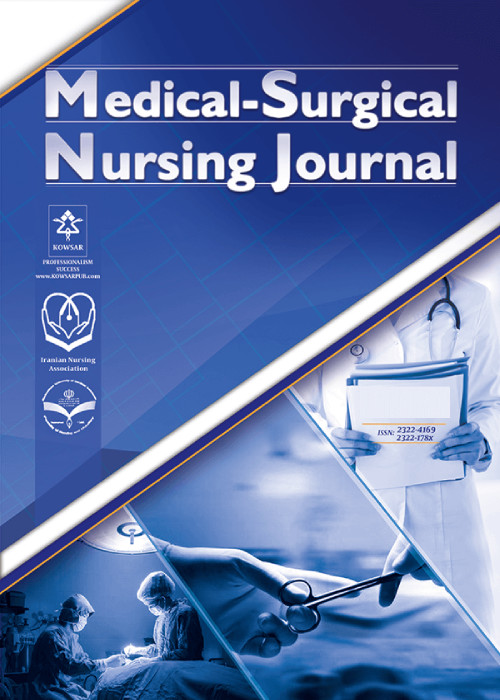The effect of education based on the collaborative care model on the nutritional behaviors of family members of patients with type II diabetes
Author(s):
Abstract:
Background And Objective
A healthy diet is one of the most important matters in caring and preventing type II diabetes in susceptible individuals. In interventional trainings performed in Iran, the family members of patients with type II diabetes are very rarely entered into training programs. Therefore, the aim of this study is to investigate the effect of education based on the collaborative care model on nutritional behavior of families of patients with type II diabetes. Materials And Method
This study is a single-blind randomized clinical trial undertaken in the Educational Center of Diabetes of Tabriz, Iran, in 2012. The sample consisted of 40 first-degree family members of patients with type II diabetes (one member from each family) who were randomly divided into two groups of intervention (20 individuals) and control (20 individuals). In order to evaluate nutritional behavior, the modified lifestyle questionnaire was applied. First, the two groups took the pre-test and then collaborative training was held for seven one-hour sessions for the intervention group. Collaborative training consisted of the stages of motivation, preparation, engagement, and evaluation. The two groups took the post-test 3 months after the intervention. The data were analyzed by using chi-square and Student’s independent t-test in SPSS version 13. Results
There was no statistically significant difference between the intervention and control groups in regards to age, gender, education level, job, marital status, and economic status. After the educational intervention, the intervention group reported better performance in comparison to the control group in items related to using fast foods (P = 0.001), fruits (P = 0.005), vegetables (P = 0.004), canned food (P = 0.003), sweets (P = 0.001), solid vegetable oil (P = 0.007), sausages (P = 0.005), the usual way of cooking food (P = 0.003) and eating heavy and late-time dinners (P = 0.007). Conclusion
The results showed that training based on the collaborative care model modifies the lifestyle of family members of patients with type II diabetes in most of the indices and nutritional behaviors. Based on the results, it is recommended to use the collaborative care model for nutritional training of family members of patients with type II diabetes.Keywords:
Language:
Persian
Published:
Iranian Journal Of Medical - Surgical Nursing, Volume:3 Issue: 2, 2014
Pages:
99 to 106
magiran.com/p1311647
دانلود و مطالعه متن این مقاله با یکی از روشهای زیر امکان پذیر است:
اشتراک شخصی
با عضویت و پرداخت آنلاین حق اشتراک یکساله به مبلغ 1,390,000ريال میتوانید 70 عنوان مطلب دانلود کنید!
اشتراک سازمانی
به کتابخانه دانشگاه یا محل کار خود پیشنهاد کنید تا اشتراک سازمانی این پایگاه را برای دسترسی نامحدود همه کاربران به متن مطالب تهیه نمایند!
توجه!
- حق عضویت دریافتی صرف حمایت از نشریات عضو و نگهداری، تکمیل و توسعه مگیران میشود.
- پرداخت حق اشتراک و دانلود مقالات اجازه بازنشر آن در سایر رسانههای چاپی و دیجیتال را به کاربر نمیدهد.
In order to view content subscription is required
Personal subscription
Subscribe magiran.com for 70 € euros via PayPal and download 70 articles during a year.
Organization subscription
Please contact us to subscribe your university or library for unlimited access!



